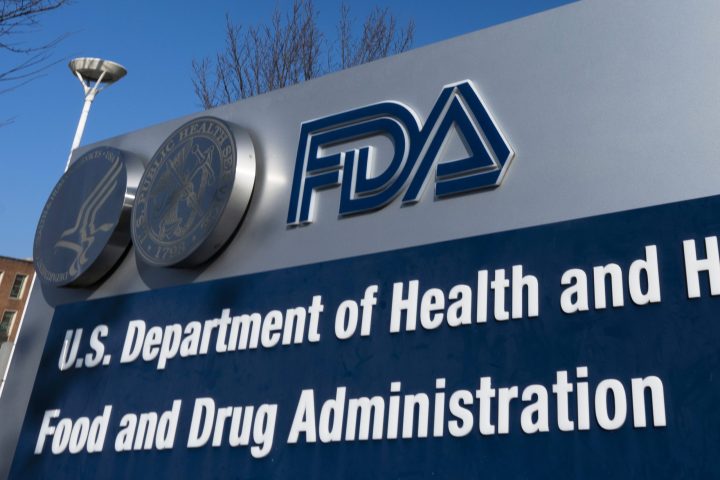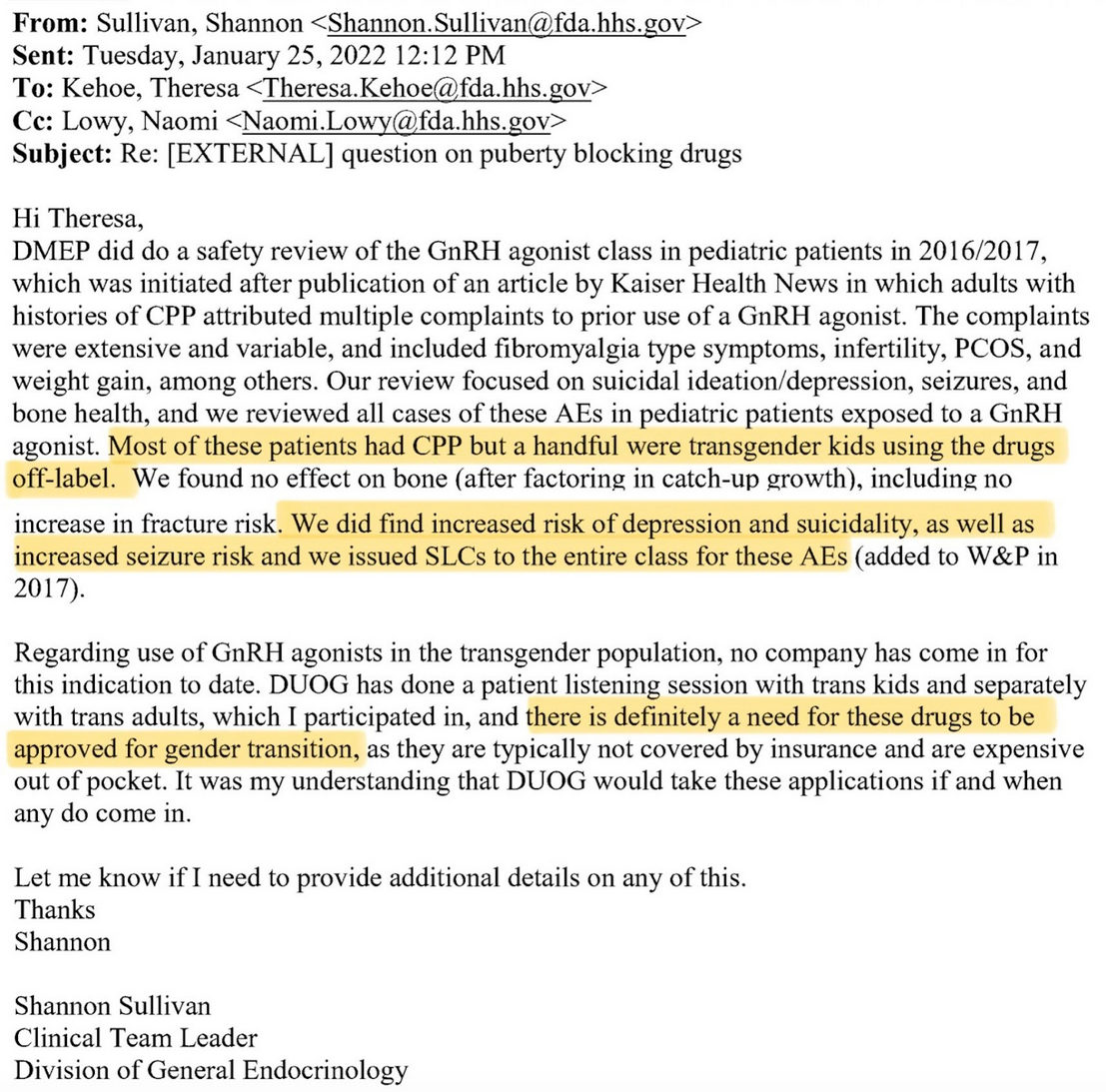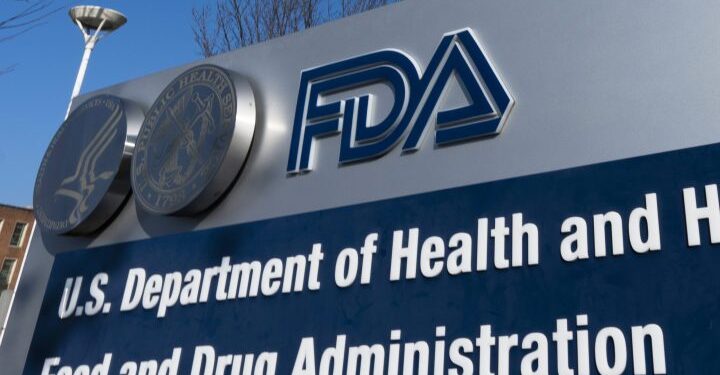
A team leader at the U.S. Food and Drug Administration (FDA) has recommended the approval of puberty blockers for minors who identify as “transgender,” despite concerns highlighted in a study linking these drugs to an increased risk of depression and suicidality. The revelation strongly suggests that the government-endorsed treatments ostensibly aimed at alleviating gender dysphoria might, in fact, exacerbate mental-health risks.
Internal communications released by the conservative nonprofit America First Legal (AFL) on Thursday revealed that Shannon Sullivan, a clinical team leader at the FDA’s Division of General Endocrinology, informed Theresa Kehoe, the director of the same division, in February 2022 about a safety study conducted by her team. The study identified a correlation between the use of Gonadotropin-releasing hormone (GnRH) agonists — commonly referred to as puberty blockers — and increased risks of depression and suicidal ideation among minors.

As appears from the email, the study, which focused on suicidal ideation, depression, seizures, and bone health, primarily involved minors with central precocious puberty (CPP, a condition in which puberty begins unusually early). However, a subset of the study participants were “transgender” children using the drugs off-label. According to Sullivan, while no significant bone-health issues were detected, the study did identify increased risks of depression and suicidality, as well as a heightened risk of seizures. This latter revelation led to safety-related labeling changes for the drugs.
Sullivan also acknowledged the patients’ complaints of fibromyalgia (a chronic condition that causes widespread pain and tenderness throughout the body), infertility, and weight gain.
Despite these concerns, Sullivan recommended moving forward with the approval of these drugs, saying that “there’s definitely a need for these drugs” for gender-confused youth. The FDA has not yet received an official application for the approval of GnRH agonists specifically for “transgender” minors, but Sullivan indicated that the agency would consider such applications if and when they are submitted.
She also noted that insurance often does not cover puberty blockers, making them prohibitively expensive for many families.
Ian Prior, senior advisor at America First Legal, condemned the FDA’s stance on the drugs, arguing that the agency is endorsing treatments that could potentially harm the very children they are meant to help.
He said,
It is shocking and unacceptable that the FDA would admit that puberty blockers cause suicidal ideation and depression, yet in the same breath recommend their approval for transgender “medical” procedures for children. The advocates of these brutal practices on children claim that they are necessary to prevent suicide and depression, but in reality, the treatments themselves cause the very thing they claim they are trying to prevent. This barbarism has no place in a civilized society and it’s time for the federal government to follow the lead of Europe in banning these experiments on children.
The organization obtained the documents through a lawsuit filed on February 28, 2023, against the FDA, alleging that the agency was concealing records related to the off-label use of puberty blockers and cross-sex hormones in children. John Zadrozny, Deputy Director of Investigations at AFL, discussed the lawsuit with The New American shortly after it was filed.
At the heart of the lawsuit are concerns about the irreversible, life-altering damage that puberty blockers and other federally endorsed drugs may cause in children and the FDA’s failure to share crucial information with the public. Zadrozny pointed out that one of the most commonly used puberty blockers, Lupron, is also used for the chemical castration of sex offenders. He further noted that many of these drugs are potent chemotherapy agents that can destroy cells and potentially lead to sterilization, among other serious adverse effects.
HHS Endorsing Puberty Blockers
The U.S. Department of Health and Human Services (HHS), a parent entity of the FDA, has supported the use of GnRH agonists as part of the so-called gender-affirming care for “transgender” minors.
According to its official guidance, “Gender-Affirming Care and Young People,” that was prepared by the Office of Population Affairs (OPA), which resides within the Office of the Assistant Secretary for Health (OASH) led by a “transgender woman” Admiral Rachel Levine, puberty blockers are used to “pause” pubertal development. While the document says that the results of the puberty-blocker use are “reversible,” this point has been contested by medical professionals.
Alongside the administration of puberty blockers, the OPA recommends the use of social affirmation for gender-confused minors, such as “adopting gender-affirming hairstyles, clothing, name, gender pronouns, and restrooms and other facilities,” as well as using the opposite-sex hormones on children (testosterone on girls and estrogen on boys) and surgically mutilating their breasts and genitals.
It is worth noting that this guidance is only a part of the Biden administration’s much broader pro-trans agenda, which includes policies ranging from “reinforcing federal protections for transgender children” to improving transgender travel experiences.
HHS Secretary Xavier Becerra has staunchly supported the off-label use of puberty blockers. As reported by The New American on May 5, 2022, Becerra testified before Congress that if there were any serious concerns about the safety of puberty blockers, the FDA would “raise the alarm.”
Other Countries
Several European countries, including the U.K., Sweden, and Finland, have recently scaled back on the use of puberty blockers for minors, citing concerns over their safety and long-term effects. These countries have implemented more restrictive guidelines due to a lack of robust evidence supporting the treatments’ efficacy and concerns about potential irreversible harms, such as impacts on bone density and fertility. Recently, the U.K.’s National Health Service (NHS) has stopped routine approval of these treatments for those under 16, and Sweden and Finland have similarly limited their use, recommending them only in exceptional cases and within the framework of rigorous clinical trials.

































